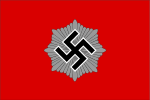| Reichsluftschutzbund | |
 Flag of the Reichsluftschutzbund | |
| Agency overview | |
|---|---|
| Formed | 29 April 1933 |
| Dissolved | 1945 |
| Jurisdiction | Occupied Europe |
| Minister responsible | |
| Agency executive |
|

The Reichsluftschutzbund (RLB; "Reich Air Protection League") was a civil defense organization in Nazi Germany in charge of air raid precautions in residential areas and among smaller businesses.
